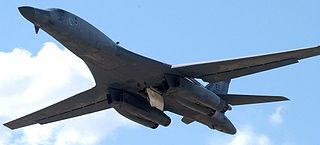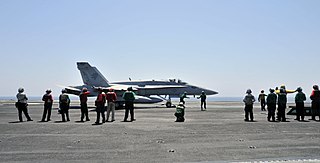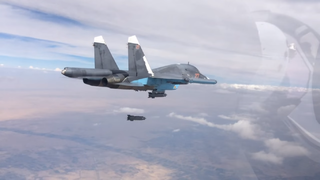Aerial warfare is the battlespace use of military aircraft and other flying machines in warfare. Aerial warfare includes bombers attacking enemy installations or a concentration of enemy troops or strategic targets; fighter aircraft battling for control of airspace; attack aircraft engaging in close air support against ground targets; naval aviation flying against sea and nearby land targets; gliders, helicopters and other aircraft to carry airborne forces such as paratroopers; aerial refueling tankers to extend operation time or range; and military transport aircraft to move cargo and personnel. Historically, military aircraft have included lighter-than-air balloons carrying artillery observers; lighter-than-air airships for bombing cities; various sorts of reconnaissance, surveillance and early warning aircraft carrying observers, cameras and radar equipment; torpedo bombers to attack enemy shipping; and military air-sea rescue aircraft for saving downed airmen. Modern aerial warfare includes missiles and unmanned aerial vehicles. Surface forces are likely to respond to enemy air activity with anti-aircraft warfare.
Wings are appendages used to create lift.

The Gora Prai airstrike was an airstrike by the United States that resulted in the deaths of 11 paramilitary troops of the Pakistan Army Frontier Corps and 8 Taliban fighters in Pakistan's tribal areas. The attack took place late on June 10, 2008, during clashes between US coalition forces and militants from the Pakistani Taliban.
The Granai airstrike, sometimes called the Granai massacre, refers to the killing of approximately 86 to 147 Afghan civilians by an airstrike by a US Air Force B-1 Bomber on May 4, 2009, in the village of Granai in Farah Province, south of Herat, Afghanistan.
The Haska Meyna wedding party airstrike was an attack by United States military forces on July 6, 2008, in which 47 Afghans were killed. The group was said to be escorting a bride to a wedding ceremony in the groom's village in Haska Meyna District of Nangarhar province, Afghanistan.
The Wech Baghtu wedding party airstrike refers to the killing of about 37 Afghan civilians, mostly women and children, and injuring about 26 others by a United States military airstrike on November 3, 2008. The group was celebrating a wedding at a housing complex in the village of Wech Baghtu, a Taliban stronghold in the Shah Wali Kot District of Kandahar province, Afghanistan.

This is a list of aviation-related events from 2014:

In response to rapid territorial gains made by the Islamic State of Iraq and the Levant (ISIL) during the first half of 2014, and its universally-condemned executions, reported human rights abuses and the fear of further spillovers of the Syrian Civil War, many states began to intervene against it in both the Syrian Civil War and the Iraqi Civil War. Later, there were also minor interventions by some states against ISIL-affiliated groups in Nigeria and Libya.

The American-led intervention in the Syrian Civil War refers to the United States-led support of Syrian opposition and the Federation of Northern Syria during the course of the Syrian Civil War and active military involvement led by the United States and its allies — the militaries of the United Kingdom, France, Jordan, Turkey, Canada, Australia and more — against the Islamic State of Iraq and the Levant (ISIL) and al-Nusra Front since 2014. Since early 2017, the U.S. and other Coalition partners have also targeted positions of the Syrian Government and its allies via airstrikes and aircraft shoot downs.

An American-led intervention in Iraq started on 15 June 2014, when President Barack Obama ordered United States forces to be dispatched to the region, in response to offensives in Iraq conducted by the Islamic State of Iraq and the Levant (ISIL). At the invitation of the Iraqi government, American troops went to assess Iraqi forces and the threat posed by ISIL.

Operation Inherent Resolve (OIR) is the U.S. military's operational name for the military intervention against the Islamic State of Iraq and Syria, including both the campaign in Iraq and the campaign in Syria. Since 21 August 2016, the U.S. Army's XVIII Airborne Corps has been responsible for Combined Joint Task Force – Operation Inherent Resolve (CJTF-OIR).

The Jordanian military intervention in the Syrian Civil War began on 22 September 2014, with airstrikes on Islamic State of Iraq and the Levant (ISIL) targets, and escalated after the murder on Muath al-Kasasbeh, a captured Jordanian pilot, by ISIL, in early 2015. Though Jordan's strikes in Syria largely tapered off after December 2015, airstrikes have continued through February 2017, and Jordan has continued to support rebel groups in Syria and host military activities of other countries.
The February 2015 Egyptian airstrikes in Libya against Islamic State of Iraq and the Levant (ISIL) positions in Libya took place on February 16, 2015, and were triggered by a video released by ISIL in Libya a day earlier, depicting the beheading of 21 Coptic Christians from Egypt. Within hours, the Egyptian Air Force responded with airstrikes against ISIL training camps and weapons stockpiles in retaliation for the killings. Warplanes acting under orders from the Libyan government also struck targets in Derna, reportedly in coordination with Egypt.

The Russian military intervention in the Syrian Civil War began in September 2015, after an official request by the Syrian government for military aid against rebel and jihadist groups. The intervention initially consisted of air strikes fired by Russian aircraft stationed in the Khmeimim base at targets primarily in north-western Syria, against militant groups opposed to the Syrian government, including the Syrian National Coalition, the Islamic State of Iraq and the Levant (ISIL), al-Nusra Front and the Army of Conquest. In addition, Russian military advisors and special operations forces were stationed in Syria. Prior to the intervention, Russian involvement in the Syrian Civil War had mainly consisted of supplying the Syrian Army with arms and equipment. At the end of December 2017, Russia said its troops would be based in Syria permanently.

The Tokhar airstrikes, also known as the Tokhar massacre, occurred on 19 July 2016 in the village of Tokhar, during an offensive by United States-backed forces near the city of Manbij in Aleppo Governorate, and carried out by the United States Air Force. The operation was carried out as part of the American-led intervention in Syria. Reports of the death toll varied, ranging from 56 to 212 civilians being killed with "entire families" pulverized.

On the morning of 7 April 2017, the United States launched 59 Tomahawk cruise missiles from the Mediterranean Sea into Syria, aimed at Shayrat Airbase controlled by the Syrian government. The strike was executed under responsibility of U.S. President Donald Trump, as a direct response to the Khan Shaykhun chemical attack that occurred on 4 April.
On 10 February 2018, an Israeli F-16I was shot down by the Syrian air defenses after conducting an air raid on Iran-backed positions inside Syrian territory. The aircraft was part of a larger Israeli aerial dispatch which Israel said was sent in response to detection of an Iranian drone spying on Israel. Two hours after the downing of the jet, Israel began attacking additional targets inside Syria, including air defense sites and Iranian targets near Damascus. Israel stated it destroyed the Syrian military’s main command and control bunker. Iran dismissed the Israeli allegation of Iranian drone incursion into Israeli territory as "ridiculous" and a pro-Syrian military alliance said that Israel actually hit a drone base which was used in the fight against ISIS.













